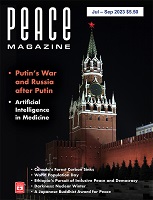You should worry about the state of the world. If you don’t, you’re morally defective. But you can choose which global problem to worry about most. So what’s your criterion? Maybe you ask: Which global threat is the most dangerous – the one that might extinguish life on the planet? If that’s your standard, you should choose between a methane burst and Artificial General Intelligence (AGI). A perfect methane burst might even outdo the Permian Extinction, which about 252 million years ago eliminated 90-96% of all marine species and 70% of terrestrial vertebrate species. By contrast, AGI apparently threatens only our own species.
But maybe you base your estimate on the actuarial formula: the seriousness of the threat times the probability that it will occur. If so, AGI may be worse, for the specialists say it is almost inevitable, whereas no one can predict confidently the probability of a gigantic methane burst, though it is getting more likely; the oceans are breaking heat records this year.
As ice melts in the Arctic ocean, the permafrost lying at the bottom perforates, letting plumes of methane escape. From the deep areas, they dissolve before reaching the surface, but from the vast shallow areas they enter the atmosphere. There are dozens of craters in Siberia the size of city blocks where methane has exploded, as it is presumably doing under the sea too, but less observably.
But maybe you base your choice of worries, not just on risk level but also on the potential for solutions. As this prayer advises, “God, grant me the serenity to accept the things I cannot change, the courage to change the things I can, and the wisdom to know the difference.” Do we have the wisdom to know the difference?
If we cannot prevent AGI from replacing humankind, the only basis for accepting it is hope that machines may be wiser than us. Fortunately, so far, we can probably change the planet’s temperature with geoengineering, but we lack the courage to do so.
So what’s left? Pray for serenity? No, thank you!



